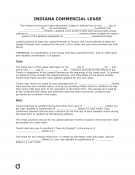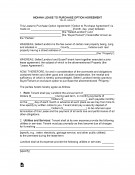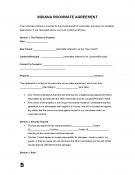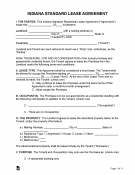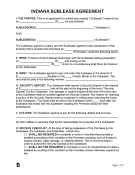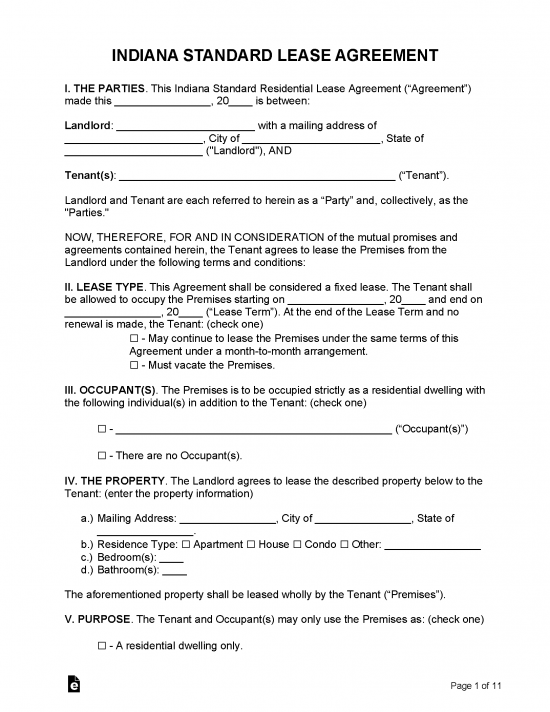Indiana lease agreements are contracts that govern a tenancy in a property owned by a landlord. The lease agreement will contain essential information like rent, the obligations of the tenant and the landlord, and which party is responsible for which utilities. Both the landlord and the tenant should keep a copy of the lease agreement and refer to it in the event of a disagreement.
Contents
By Type (6)
- Commercial Lease Agreement
- Month-to-Month Lease Agreement
- Rent-to-Own Lease Agreement
- Roommate Lease Agreement
- Standard Lease Agreement
- Sublease Agreement
Download: Adobe PDF, MS Word, Rich Text Format
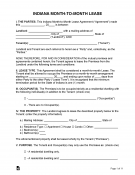 Month-to-Month Lease Agreement
Month-to-Month Lease Agreement
Download: Adobe PDF, MS Word, Rich Text Format
Download: Adobe PDF, MS Word, Rich Text Format
Download: Adobe PDF, MS Word, Rich Text Format
Download: Adobe PDF, MS Word, Rich Text Format
Download: Adobe PDF, MS Word, Rich Text Format
Landlord-Tenant Laws
Statutes – Title 32, Article 31 (Landlord-Tenant Relations)
Required Disclosures (2)
Lead-Based Paint Disclosure – Federal law requires that a form explaining the hazards of lead-based paints be provided to any tenant leasing a property built before 1978.
Managers and Agents – Landlords must identify and provide an address for the people that are able to receive tenant demands and provide repairs (§ 32-31-3-18).
Security Deposit Laws
Maximum Amount ($)
Indiana does not set a maximum security deposit amount by statute.
Returning to Tenant
After the conclusion of a rental agreement, the landlord should return the amount provided as a security deposit to the tenant within forty-five (45) days. The landlord may retain a portion of the security deposit to cover costs associated with a tenant’s violation of the rental agreement or the law, or unpaid sewer and utility charges. If the landlord chooses to retain a portion of the deposit, the landlord must provide a written description of all costs to the tenant. The forty-five (45) day time period for providing the deposit and the itemization, if any of the deposit is retained, does not begin until the tenant has provided the landlord with a new address. If the landlord fails to comply with these rules, the tenant is entitled to the entire security deposit (§ 32-31-3-12).
When is Rent Due? (grace period)
The landlord and tenant may determine when rent is due in the lease agreement. Indiana law does not require a grace period.
Eviction Notice (non-payment)
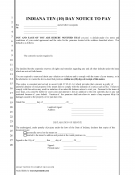 10-Day Notice to Pay or Quit – If the tenant fails to pay rent by the agreed-upon date, then the landlord or the landlord’s agent may post this notarized form on the dwelling unit, informing the tenant of the obligation to pay all owed rent within ten (10) days or the landlord may begin eviction proceedings (§ 32-31-1-6).
10-Day Notice to Pay or Quit – If the tenant fails to pay rent by the agreed-upon date, then the landlord or the landlord’s agent may post this notarized form on the dwelling unit, informing the tenant of the obligation to pay all owed rent within ten (10) days or the landlord may begin eviction proceedings (§ 32-31-1-6).
Download: Adobe PDF
Maximum Fees ($)
Late Rent Penalties
There is no statutory limit to penalties that a landlord may impose for late rent. However, if a landlord chooses to impose a late fee, the fee should be included in the rental agreement and should be reasonable.
NSF Checks
There is no specific law for how much a landlord may charge for a rent check provided with insufficient funds. However, in the portion of the Indiana code dealing with the repayment of small loans, the state permits a fee of no more than twenty-five dollars ($25) for each returned check (§ 24-4.5-7-202).
Tenant’s Unclaimed Property
If a landlord finds personal property belonging to a tenant after the lease has concluded, the landlord’s recourse depends on the circumstances. If a reasonable person would conclude that the tenant has abandoned the property, the landlord may dispose of the personal property as he or she sees fit. If the property includes medical supplies, childcare items, or tools of a trade, the landlord must make these immediately available to a tenant regardless of storage costs. If the property does not appear to have been abandoned, the landlord must deliver the property to a storage facility after serving an order to remove the personal property and providing the tenant with the location of the storage facility. Once at the storage facility, the tenant is responsible for the costs of storage and must pay them before receiving the property. If the tenant does not recover the property within ninety (90) days, the storage facility may sell or dispose of the property (§ 32-31-4).
